I love Dwarf Fortress! It's brutal, unforgiving, and it doesn't care about helping you learn how to play. The lesson of Dwarf Fortress is that eventually, no matter what, you will lose. You will learn from losing, you will grow into a better player, and you will become better and stronger and smarter. But I do not want to play that as a tabletop RPG. That is the closest comparison I can make of what level drain embodies for me, an inescapable death spiral for the character and a "reset button" for the player.
The way level drain was first described to me, and the way I've always envisioned it ever since, was that when your character gets drained they don't lose xp. Instead your level drops but your xp is still used to calculate when you level up. If you don't see a cleric and get a Restoration spell cast then you're simply stuck at that level as you level up. So if you're a 7th level fighter (125k xp for level 8) and you get drained down to level 1, if you manage to acquire 125,000 xp afterwards then you go up to level 2 - until you see a cleric, if ever.
But it turns out that was a houserule.
It would be fair to say that I have never played with a GM who used level drain as described by the rules. Either the GMs I played with didn't understand exactly how it was supposed to work, or they understood it but modified it to fit their personal style. The only time I have encountered level draining monsters were as a cheap way of stripping a PC of their levels. When I started GMing I never used monsters that had level drain abilities, and the one time I had a vampire NPC I just houseruled it as a Constitution drain that would heal the vampire of hit points.
 1st edition Advanced Dungeons & Dragons
1st edition Advanced Dungeons & Dragons
What the rules say: Referred to as energy drain, it causes the character to lose a level without a saving throw. Hit points and abilities from the experience level are lost, and xp is dropped to the mid-point of the next lower level. Characters reduced to zero level can never gain xp again, and zero level characters die when they are drained of a level.
Monster descriptions: Brief summaries of the effect, but descriptions assume you have access to the PHB and DMG.
Recovery options: 7th-level cleric spell recovers a single level by restoring lost experience points to the minimum needed to recover the lost level. There is a time limit of effectiveness based on the cleric's level.
The first time I had a character get level drained, the GM basically isolated my character and forced me into a one-on-one encounter with a spectre, and he only realized as I was about to die that I didn't have a single weapon that could have hurt the thing. I have only ever seen level drain used in this manner, as a personal "challenge" or as a punishment by a pisspoor DM (with one exception, the original Ravenloft module and the third time I ever played D&D). But even if that weren't my experience, the concept is pretty flawed simply because it's not very elegant.
Let's assume an 8th level fighter is going up against a vampire, an 8 HD creature. Seems like a pretty even match, right? But the vampire wins initiative. Suddenly the fighter is 6th level and it's no longer an even match, and if the circumstances of that situation mean the fighter is trapped or was forced into this fight then you're basically playing a game of "Who wins initiative?" followed by a game of "How long can we keep this character alive through sheer luck of dice rolls?" and all because you lost the first round of initiative.
I can't imagine where this might be an acceptable game mechanic because it ranks right up there with "let's have your 14th-level character make this saving throw or else they die" in terms of how fun it is.
Zak Smith has told me that I just need to play smarter, but this statement assumes the GM is smart too (and also assumes the GM isn't some sadistic dickhead who GMs with something to prove). The GM is responsible for setting the stage and delivering information to the players about their environment, and if the information is paltry or even nonexistent, or the GM deliberately ambushes the player, then you're never given the opportunity to play smarter. I've played games where I've never even been given the opportunity to run away, or running away was simply not an option from how the GM described the scenario.
Let's say my character has been asked to hunt down a vampire that's tormenting the little town of Barovia and I ask the GM how he uses level drain, the GM says "vampires have traditional level drain." I would likely try to do everything in my power to avoid confronting the vampire directly. I'd turn his servants against him rather than face him head on. From my personal experience, no GM would ever allow such tactics to work, they would always force a direct confrontation with the main villain or simply allow all of your schemes to spoil in some way.
The same Zak Smith uses level drain for his vampires in
Red & Pleasant Land and in that adventure it seems completely appropriate, there are no ambushes or Gotcha! moments written into R&PL. A good GM with smart players could have a grand olde tyme evading the dark machinations of the vampire lords in Voivodja, but if it were me I still wouldn't use level drain as its written.
Let's examine my reasons why.
Exhibit A: Absurdity
A character's xp and level are meant to be an abstract way of determining how skilled and learned a character is, just as hit points is an abstract way of determining overall health and fatigue. Levels are not just a way of giving your character hit points but they also represent stuff your character
knows. Fighters know better moves, wizards learn better spells, thieves learn how to sneak and pickpocket better, and so on. When those things disappear because a wight touched your skin it just doesn't make sense because it's not called memory drain.
There's a counterargument that levels don't represent memory but overall skill. When your level is drained you are becoming sluggish and less skilled, hence the loss of skills.
Then why doesn't level drain actually do that by draining skills and abilities? Why the abstract overall level? My answer to that is: see
Exhibit D.
Exhibit B: Houserules + Paperwork
I have never seen a GM, nor heard of a GM, who uses level drain
by the book. Why keep using level drain if nobody actually uses it the way it's written?
The DMG suggests that to be truly accurate when PCs level up you should instruct players to write how many HP they earned as a string of numbers on their character sheet. This was back in 1st edition when you didn't have proficiencies and skill checks and you also had level-based saving throws that weren't tied to ability scores. In both 1st and modern editions, unless you're doing that with every aspect of levelling up then the paperwork involved slows down play, and I would want the mechanic to be elegant and simple. I suspect the reason most people houserule level drain is because of this complexity, the tedium of rewriting a character stops the action at the table.
Exhibit C: Recovery is a bitch!
Unconsciousness and petrify have magical solutions which can end them in one casting. Death is a variable because some GMs don't allow Raise Dead or Resurrection in their games, but according to the rules a single spell can still
solve that problem. In comparison Level Drain is not simple, recalculating HP, losing abilities and erasing xp and on top of that Level Drain requires multiple castings of Restoration to correct, and even then you've lost the xp forever so you can't recover completely.
The Restoration spell will only bring the character back up one level per casting, and even then your xp is only restored to the bare minimum of what was necessary to get to that level. That's lame all by itself. The mechanic is simply a way to divest a PC of experience points. The xp lost is completely and utterly unrecoverable. I don't even mind the rule that it might require multiple castings of Restoration to return to the level at which you once were, but the permanent loss of xp is just unacceptable to me. That is primarily why I find the effect so tiresome and nobody seems to want to argue a case for justifying or overlooking this part of the rules.
If a single Restoration could bring you back to what you were at pre-draining (without any loss of xp) then I would likely have less of an issue with it.
But then I'm just houseruling it, aren't I?
Exhibit D: Cheap
How do you know it's cheap? There's no save. It just happens. This is the biggest factor about why I think it's dumb. Level drain isn't even in the same category as a save-vs-death or vs-unconsciousness or vs-petrify. Those things suck, but at least they're still simple effects and you get to roll dice.
It's not scary to lose xp and levels permanently, it's eye-rollingly boring. Especially if you're less than 1000 xp away from your next level and some GM springs a level drain on you then you're basically fucked. It's a cheap shot, and Gygax was
the king of cheap shots!
In summation
I'm already playing RPGs to have fun and cut loose and I don't like the idea of tracking each individual HP roll every time I level up, or tracking my skills either. Just playing as a wizard and tracking my maximum ability scores in DCC was pretty time-consuming (but not to the point of making that game completely unfun). Furthermore, if I'm playing a high level fighter and I'm only 1000 xp shy of level 9, get drained to 7, then still manage to defeat my enemy and get a Restoration spell, I would still have permanently lost hundreds of thousands of experience points. That's stupid. I would rather play a houserule where I can still recover that lost xp, or in a different game altogether.
More comparisons & addendum
 2nd edition Advanced Dungeons & Dragons
What the rules say: Virtually identical to 1st edition rules except the effect is clarified for all classes with extra paragraphs.
2nd edition Advanced Dungeons & Dragons
What the rules say: Virtually identical to 1st edition rules except the effect is clarified for all classes with extra paragraphs.
Monster descriptions: Simple descriptions that assume you have a DMG.
Recovery options: Identical to 1st edition, however Wish is made note of as a spell that can cure all lost levels with a single casting.
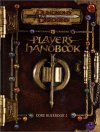 3rd edition Advanced Dungeons & Dragons
What the rules say: Energy drain is simplified into a cumulative negative effect applied to ability/skill checks, attack rolls, saving throws, hit points, and character level. Saving throws now apply to avoid the energy drain and experience points are unaffected. The rules are completely absent from the PHB and the entirety of the effect's description is in the DMG.
3rd edition Advanced Dungeons & Dragons
What the rules say: Energy drain is simplified into a cumulative negative effect applied to ability/skill checks, attack rolls, saving throws, hit points, and character level. Saving throws now apply to avoid the energy drain and experience points are unaffected. The rules are completely absent from the PHB and the entirety of the effect's description is in the DMG.
Monster descriptions: Simple summaries which refer to the effect and explain what the saving throw is to avoid.
Recovery options: The cleric spell, Restoration, has been brought down to 4th level but otherwise is identical to the 1st and 2nd edition versions of the 7th-level spell Restoration. A new 7th-level spell, Greater Restoration, recovers all lost levels from an energy drain with a time limit measured in weeks rather than days.
I was expecting there to be a bit more variation between 1st and 2nd editions, but this just shows that 1st and 2nd edition rules changed only in miniscule ways while 3rd edition introduced the first radical departures from the original ruleset.
 4th edition Advanced Dungeons & Dragons
What the rules say: Never mentions level draining in either the PHB or the DMG.
4th edition Advanced Dungeons & Dragons
What the rules say: Never mentions level draining in either the PHB or the DMG.
Monster descriptions: Previously level-draining monsters have direct damage attacks with names that are called "life drain" or "soul siphon" but the words level drain and energy drain are never mentioned anywhere. Just reading the Vampire entry without the context of an undead lord it reads like a blood sorceror with tons of attacks that can only damage a single target. Lame.
Recovery options: Rest for an hour and you'll probably be fine (I fucking hate 4th edition).
 5th edition Advanced Dungeons & Dragons
What the rules say: Nothing. It doesn't exist anymore.
5th edition Advanced Dungeons & Dragons
What the rules say: Nothing. It doesn't exist anymore.
Monster descriptions: Monsters that used to have energy drain have been replaced with abilities that lower hit points permanently. This is, to me, scarier than the traditional level drain, however the effect is nerfed right out of the gate since every ability describes that the permanently lost hit points can be recovered after a Long Rest, 5th edition's mechanic for "sleeping it off." The vampire in the 5e Monster Manual just seems like a crude version of Lugosi's Dracula.
Recovery options: Restoration no longer exists. Lesser and Greater Restoration still exist as 2nd- and 4th-level spells, but they now apply healing to different damaging effects.
Losing level drain from the rules completely doesn't seem right. Powerful undead, especially vampires, should have some kind of special attack that you can frighten PCs with. The whole concept behind level draining is that a character drained below zero level becomes an undead version of themselves. You can leave a similar attack in place of level drain and still have an ability to frighten PCs into picking their battles and running away if they need to.
Let's take a look at how some of the OSR systems handle level drain starting with the ones most similar to, or mimicking, the original AD&D rules...
 Labyrinth Lord
What the rules say:
Labyrinth Lord
What the rules say: Alternately refers to effect as energy drain, drain energy, or level drain. Rules are explicit that there is no saving throw and the character loses HD and abilities associated with levels lost, but doesn't mention xp loss.
Monster descriptions: Repeat incomplete summaries of level drain rules, and some descriptions are explicit about losing xp to the minimum of the new level.
Recovery options: Restoration spell recovers one level but with a time limit based upon caster level, also recovers xp to minimum of restored level.
 Adventurer Conqueror King
What the rules say:
Adventurer Conqueror King
What the rules say: Rules are explicit, calling the effect energy drain. There is no saving throw and the character loses abilities associated with the levels lost, including reducing xp to minimum of new level. Rules also explicitly call out that only ritual magic can reverse the effect.
Monster descriptions: Do not summarize rules but simply refer to the effect as energy drain.
Recovery options: There is no Restoration spell. Wish is called out as an appropriate ritual spell for recovering levels but there is no mention of recovering xp.
 Castles & Crusades
What the rules say:
Castles & Crusades
What the rules say: Calls the effect energy drain and allows a Constitution-based saving throw to avoid. Explicitly calls out loss of abilities and HD associated with levels lost, and xp is reduced to halfway point toward next level. Characters can be drained to zero level, but drained below zero level causes death.
Monster descriptions: Each monster description gives a brief but comprehensive summary of how the energy drain works.
Recovery options: Restoration spell recovers one lost level, and Greater Restoration spell recovers all lost levels and abilities. Both have time limits based on the level of the spell caster, and neither mentions recovering xp.
 OSRIC
What the rules say:
OSRIC
What the rules say: Rules are explicit, calling the effect level drain. The character loses abilities associated with the levels lost, including reducing xp to minimum of new level.
Monster descriptions: Alternates between calling it level drain and energy drain, but otherwise simply lists the effect and doesn't repeat a summary of the rules.
Recovery options: Restoration spell recovers one level, has a time limit based upon caster level, and brings the character back to minimum xp for level restored.
 Adventures Dark and Deep
What the rules say:
Adventures Dark and Deep
What the rules say: I don't own the Game Master's Toolkit
Monster descriptions: I don't own the Bestiary
Recovery options: Restoration spell recovers one lost level, has a time limit based on the level of the caster, and doesn't mention recovering xp.
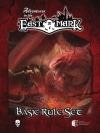 Adventures in the East Mark
What the rules say:
Adventures in the East Mark
What the rules say: No explicit description within the rules.
Monster descriptions: Referred to as energy loss, it causes a loss of HD and abilities but there is no mention of losing xp.
Recovery options: Restoration recovers all lost levels but must be performed within 24 hours of losing them.
The following OSR systems deviate in significant ways from the original AD&D rules...
 Swords & Wizardry
What the rules say:
Swords & Wizardry
What the rules say: No rules given and no mention of xp loss.
Monster descriptions: Describes effect as level drain, and adds whether the characters dies or becomes the monster in question if reduced to zero level. Effect is described as if level is just another separate set of hit points.
Recovery options: Restoration spell recovers all lost levels.
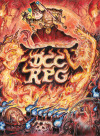 Dungeon Crawl Classics
What the rules say:
Dungeon Crawl Classics
What the rules say: No section explicitly describes it.
Monster descriptions: Some monsters have a "drain xp" or "vampire bite" ability that drains xp if a Will save is failed, and nothing describes what happens if xp drops below the current level - probably nothing because in DCC losing 1 point of experience can be potentially devastating. Ironically, there is no vampire in the monster section of the rules.
Recovery options: The Restore Vitality spell only recovers lost ability scores and there is no apparent way of recovering lost xp.
 Lamentations of the Flame Princess
What the rules say:
Lamentations of the Flame Princess
What the rules say: Describes the traditional effect of level drain but offers a fairly powerful and brutal Constitution drain rule as an alternative time saving rule.
Monster descriptions: There are no monsters in the rulebooks.
Recovery options: There is no spell for recovering lost levels or lost attribute points.
I really like the way LotFP handles level drain because losing Con is a simple way of tracking the loss of energy and your maximum HP will degrade as you lose Con, plus in the LotFP rules the draining is actually more brutal for a high level character and could be used with a low-level character and still be an equal challenge because it only takes a few drains to die from it but it's always based on the character's Constitution, which rarely goes up and down from level to level.
Unexpectedly, I also really like the DCC method where the character loses 1 xp per drain, even though that's a devastating effect and it's still permanent the character won't lose levels from the effect and will only be pushed back from earning new levels - and ironically, the opposite of how the rule was first explained to me.
How I would bring back Level Drain while running 5th edition D&D
I would let my players decided between two options:
1) use LotFP's alternative system for Con draining. This still gives most characters a lot of breathing room since it only drains 2 Constitution at a time, but give the Vampire double the effectiveness and you've restored a monster to a semblance of brutality that modern players will gasp at. The 4th-level spell Greater Restoration is required to recover this lost Constitution, a Long Rest simply won't cover it.
2) modify the monster entries in the 5th edition Monster Manual so that instead of permanently draining hit points or ability scores convert the damage dice to an XP loss multiplier. 1d4 Strength damage? No, 1d4 x 100 experience points. 4d8 hit points? No, 4d8 x 100 experience points. These effects all have saving throws built in so if you fail the save then the experience points are lost permanently, just like in DCC. This way spells don't need to be modified to accommodate the new rule and a Long Rest still
just won't cut it!
Yup, a house rule!
Why not? Everybody else does it.
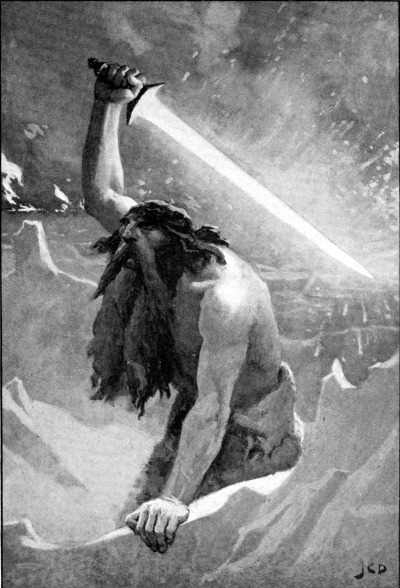 The noise drew the attention of some nasty fellows coming down the hall, and as Horatius looked around the corner he saw the troll that had killed Braak followed by his holy warrior friend and two other miscreants. All of the PCs each uttered the word "Micma" to prevent the teleport trap from affecting them, and one of the troll's friends noticed and loudly announced "That word, Micma, must be what turns off the teleport trap!"
The noise drew the attention of some nasty fellows coming down the hall, and as Horatius looked around the corner he saw the troll that had killed Braak followed by his holy warrior friend and two other miscreants. All of the PCs each uttered the word "Micma" to prevent the teleport trap from affecting them, and one of the troll's friends noticed and loudly announced "That word, Micma, must be what turns off the teleport trap!"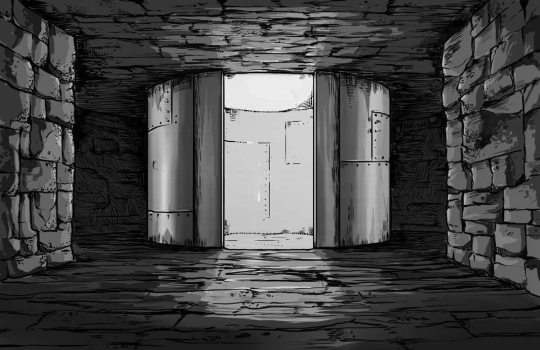

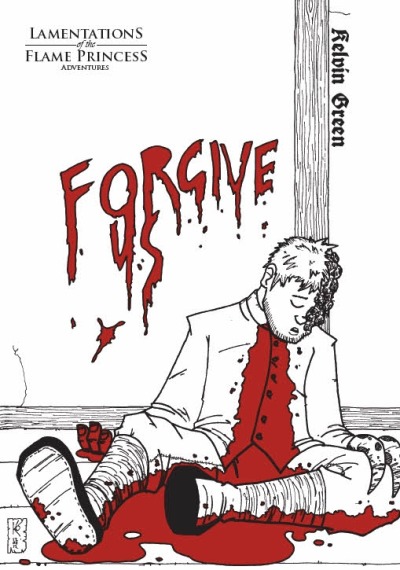
 Ritual Spellcasting
Ritual Spellcasting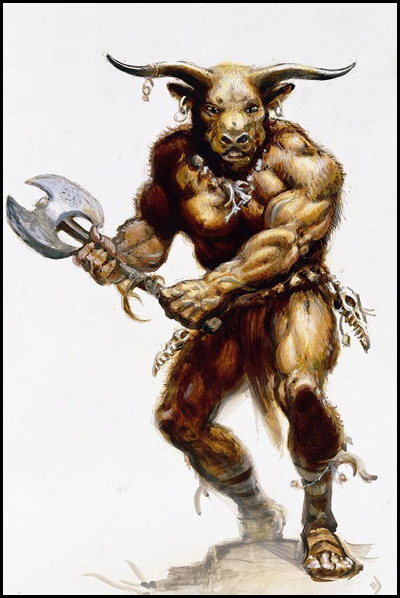 Bik and his entourage of minotaurs in the throne room were taken down. The players won initiative and got judicious use out of Stinking Cloud and Fireball, and Bik was dead within 3 rounds despite his virtual immunity to poison (this was imparted from a magical item he was wearing, see below).
Bik and his entourage of minotaurs in the throne room were taken down. The players won initiative and got judicious use out of Stinking Cloud and Fireball, and Bik was dead within 3 rounds despite his virtual immunity to poison (this was imparted from a magical item he was wearing, see below).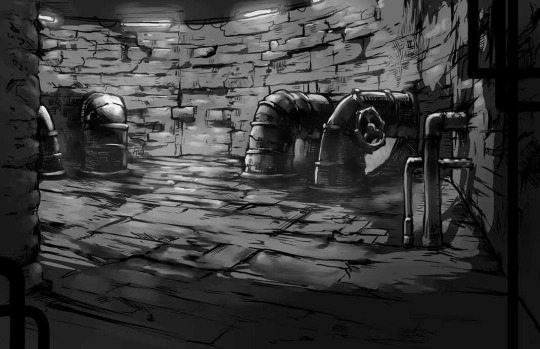
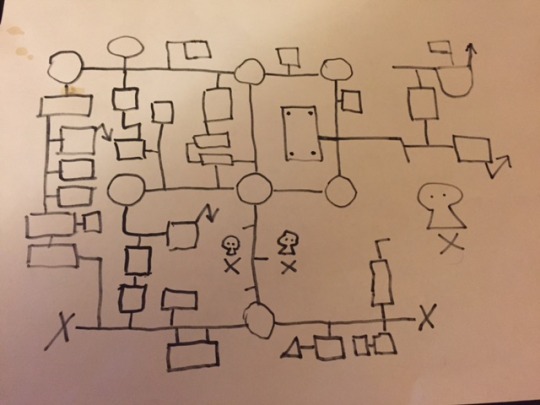






 Braak mentioned to Horatius that he thought he saw
Braak mentioned to Horatius that he thought he saw 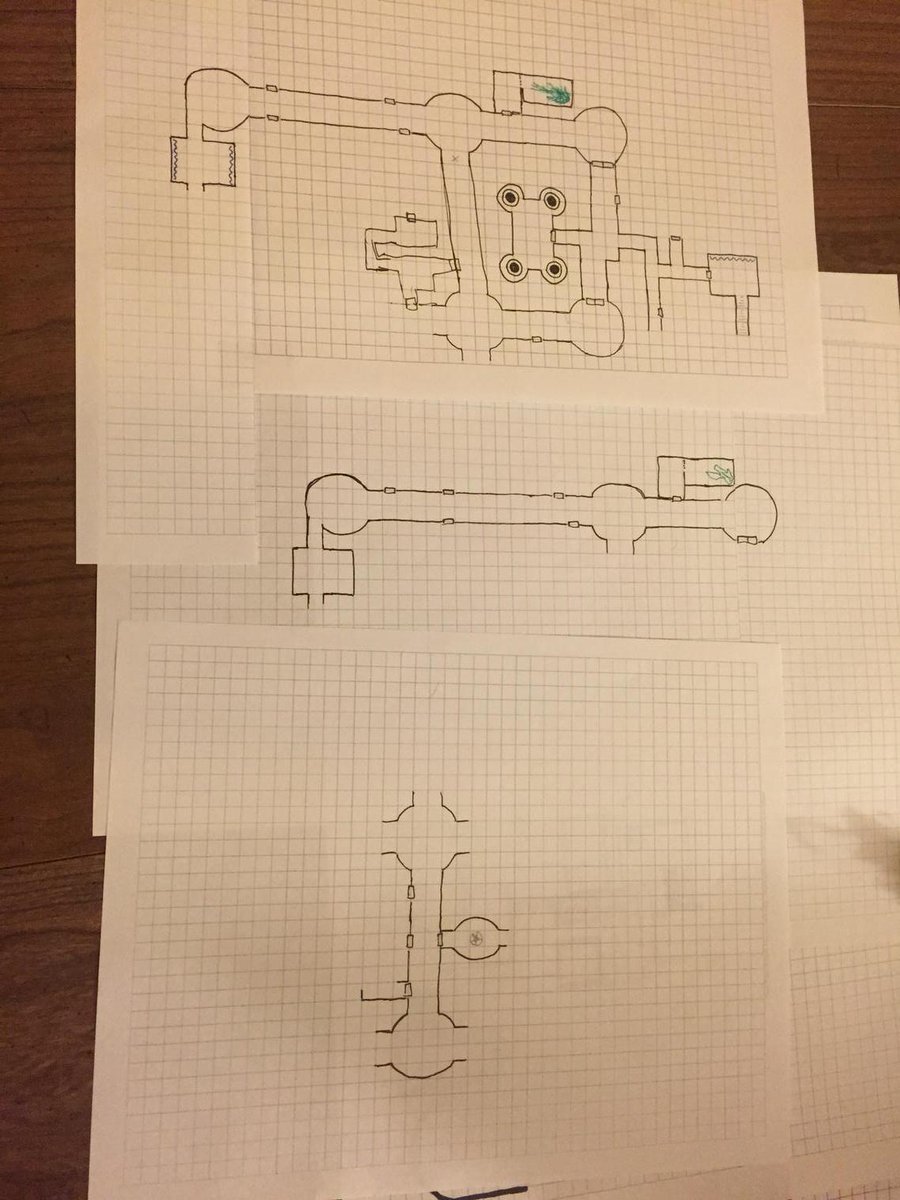 The party experimented with the teleportation trap, accidentally getting split up. Ilona got lost into darkness with Sulla. Tsetsig heard and saw a group of minotaurs fighting
The party experimented with the teleportation trap, accidentally getting split up. Ilona got lost into darkness with Sulla. Tsetsig heard and saw a group of minotaurs fighting 